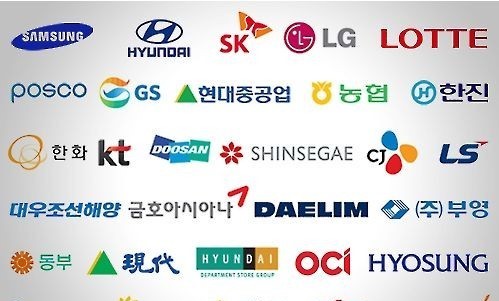Trading between companies affiliated with South Korea's large business groups has been on a steady rise despite tough regulations, the country's corporate watchdog said Monday.
Under the current regulations, which were revised in 2014, inter-affiliate trading within a business group whose owner and family hold 30 percent or more of listed affiliates is banned. For unlisted subsidiaries, the limit is 20 percent.
Such trading is blamed for allowing owner families to easily net large profits by having subsidiaries award lucrative contracts to each other, undermining the principle of fair competition.

Corporate logos of South Korea's largest companies. (Yonhap)
According to the Fair Trade Commission, a total of 159 companies were subject to the regulations with their banned trading reaching 7.9 trillion won ($7.1 billion). In that year, such inter-affiliate trading accounted for 11.4 percent of their total transactions.
But the inter-affiliate trading by 203 companies has been constantly rising, reaching 14 trillion won in 2017, and the portion of such trading stood at 14 percent last year, according to the FTC.
The FTC said earlier it would seek to lower the threshold to 20 percent for listed affiliates, and restrict deals that favor companies owned by the founding family members of large businesses.
Big business groups, known as chaebol here, have in recent years moved to sever ties with affiliates run by founders' family members to avoid tougher regulations on intra-group transactions.
Not all inter-subsidiary dealings are unlawful, but certain cases are prohibited under the antitrust law as such practices are often used to boost the value of smaller affiliates or even paper companies set up and owned by founding family members. (Yonhap)

![[AtoZ into Korean mind] Humor in Korea: Navigating the line between what's funny and not](http://res.heraldm.com/phpwas/restmb_idxmake.php?idx=645&simg=/content/image/2024/04/22/20240422050642_0.jpg&u=)


![[Herald Interview] Why Toss invited hackers to penetrate its system](http://res.heraldm.com/phpwas/restmb_idxmake.php?idx=645&simg=/content/image/2024/04/22/20240422050569_0.jpg&u=20240422150649)
![[Graphic News] 77% of young Koreans still financially dependent](http://res.heraldm.com/phpwas/restmb_idxmake.php?idx=645&simg=/content/image/2024/04/22/20240422050762_0.gif&u=)
